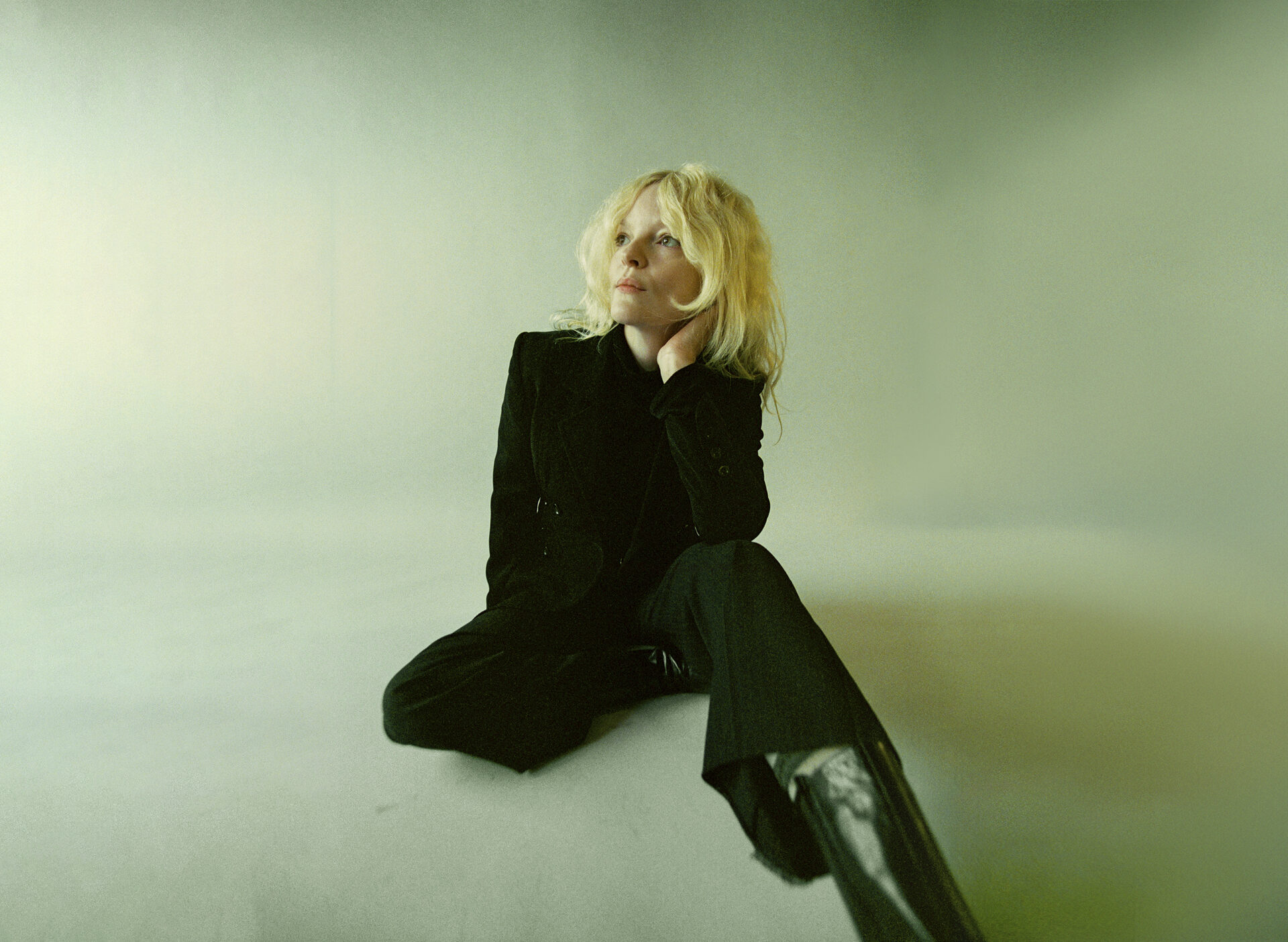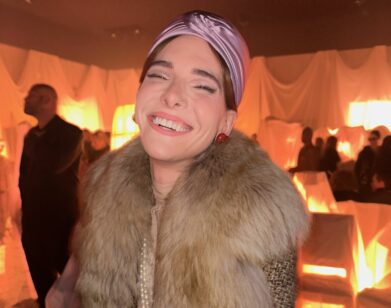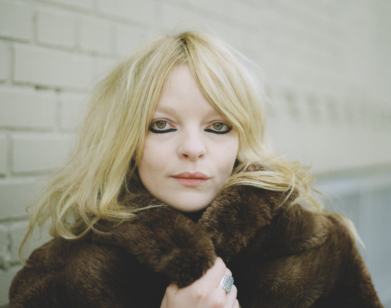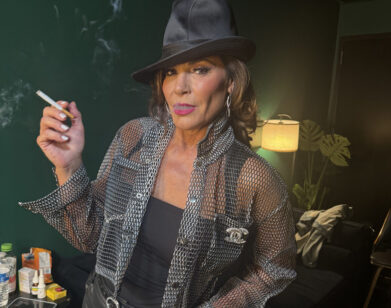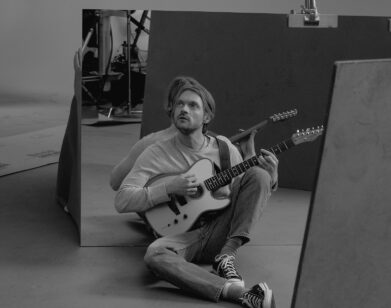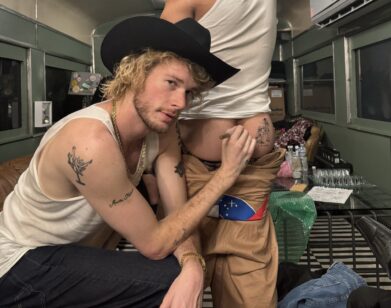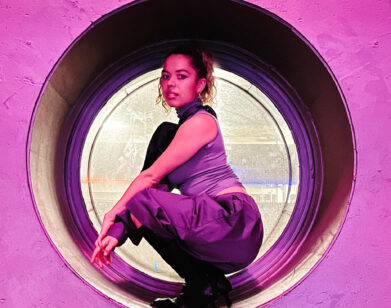in conversation
Jessica Pratt Meets Her Number One Fan Molly Gordon
Jessica Pratt’s newest record, Here In the Pitch, was born in the bathroom. The folk singer wrote a majority of her fourth album, and her music, crammed into various small rooms in her L.A. home, yet her music maintains its transcendent quality. Her distinctly bewitching voice and orchestral production takes you back to another era, and her music is endlessly replayable—just ask her number one fan, the actor Molly Gordon, who’s killing her discography one song at a time: “And by killing,,” Gordon says, “I mean listening to every moment because I have to get it inside my bones.” So when they hopped on a call, the pair got right into the music, from Troye Sivan’s poppy rework of her biggest hit, “Back, Baby” to the lost joys of CD collecting.
———
JESSICA PRATT: Can you hear me okay? Let me turn this damn thing on.
MOLLY GORDON: The reveal.
PRATT: The reveal that will shock the nation. I’m actually in my laundry room right now because it’s been raining so much in L.A. Are you in L.A.?
GORDON: I’m in New York, and we were just talking about how fucking hot it is. We have to start with the weather in every conversation.
PRATT: I find weather to be a grounding subject. It’s a two-level place that I live in, and the downstairs is half-subterranean, so there’s just been a little bit of a mold problem. So this is the place I go when I have to shut a door and it’s not also moldy. I’m just a ragamuffin in the closet right now.
GORDON: Have you written any music or recorded any music in this laundry room?
PRATT: Not the laundry room, but I’m going to be honest with you, I have written a lot—I would say a majority of the record— in various bathrooms in my house. I have two bathrooms. There’s this little dedicated storage studio room downstairs, but I don’t really like the vibe in there. I prefer the bathrooms because they have windows. And this has historically been a thing.
GORDON: That’s great.
PRATT: The acoustics in the bathroom are always good. It’s a little echoey, so you get that natural reverb.
GORDON: I also feel like, as an artist, you dream of having this space that you’re going to be artistic in and free in, and you just never can find it there. It’s always in the more uncomfortable spaces that you feel the most free.
PRATT: Yeah. Do you have that experience? Have you fantasized about a dedicated space that you may end up not using?
GORDON: Totally. I also dream of having more time to write or more time to sleep. But it’s always the time that I crammed something in or I didn’t sleep that I did my best work. I have a kind of officey space and I don’t write in it. I write on the couch, I write in bed, I write on the floor, I write in the car, I write anywhere but the desk.
PRATT: I think there’s a quote by a writer, it might be Maya Angelou, but somebody said that they don’t like to write in a situation that feels overly formal or dedicated. It has to be really simple and basic. It’s like, if you go on a writing retreat and there’s so much pressure to produce something of merit that you kind of revert or go into this weird masochistic mode where you just can’t work.
GORDON: It truly is horrifying. I have many questions for you. I am such a big fan, truly.
PRATT: Thank you, same. I was amazed you wanted to do this.
GORDON: No, no. I was just saying my dream is to be a 60 Minutes correspondent, so getting to not talk about myself and talk about you is a gift. I came to your music at a time when I really needed it, and it feels like a healing bomb. You have one of the most distinctive voices I’ve ever heard. Was this always your sound?
PRATT: That’s very kind of you. I don’t know how it originated. I did sing a lot as a kid. I grew up in a house where it was me and my mom and my older brother who was really into comedy, and my mom was also really funny, so we did a lot of voices all the time. We were obsessed with watching The Simpsons and stuff, and there were a lot of weird impersonations. And maybe having that foundational experience that voices can be versatile and you can play around with their texture and the way they come out of your body helped. And I’ve always liked music sung by people with idiosyncratic voices. A lot of times they may exist in an androgynous or ageless sort of realm, which is very intriguing to me.
GORDON: Totally. As a fan, I always listen to one song over and over, so obviously it was “Back, Baby.” So I want to first ask, how did the Troye [Sivan] thing happen?
PRATT: So the Troye thing happened pretty much in the standard way that pop stuff goes down, which is that a song is sampled in the studio, and when it’s fully done, they send it to you and they ask if you’re willing to talk about it. It was very surprising, and I am not in any way up to date on pop music. It’s never been my thing. But I think Troye’s really cool. He’s sort of like an auteur pop star and has a beautiful voice, and I felt like the song still had impact. I think a lot of times when something is sampled, it can kind of be removed from its emotional core, but it still felt like a tearjerker to me. I think they did a really good job.
GORDON: That song helped me really through a breakup. And then my friend wasn’t aware of your work and was like, “Have you heard this song on Troye’s album?” and it was helping them through their breakup. And I was like, “Wait, that’s sampling my favorite artist.” And you have this sound where it’s like your songs could have been recorded 50 years ago or now, and that’s what’s really cool about your work. The song that I’m killing, and by killing I mean listening to every moment because I have to get it inside my bones, is “Better Hate.”
PRATT: “Better Hate” was actually the first song that I wrote that ended up making it onto the album. It was the first song that I wrote that I kept.
GORDON: Where were you writing this music?
PRATT: I lived in a house in Highland Park in Los Angeles at this time. This was summer of 2020, so June or something. A crazy ass—
GORDON: A perfect moment in the world and a great time.
PRATT: [Laughs] Wonderful time for everyone. Super good vibes. I had actually been struggling to get anywhere with writing until that point, because everything felt insane. And also it felt kind of obscene to be writing a song. It was a grim time and I think a lot of people struggled to really do much creatively. So when that song came, it felt sort of like a beacon.
GORDON: Now I’ve read this about you, but honey, let’s not believe the internet. Let’s hear it from the actual source. I know that you record a lot of your own music on tape with just yourself. This record has really fun other instruments and some—by the way, I’m going to show how I’m not a musical artist.
PRATT: I love it.
GORDON: Some world music sounds. It’s some percussion that’s really interesting. Who produced it? How did the recording go about?
PRATT: So the previous record and this record both were recorded at a studio in New York called Gary’s Electric. I worked with the same engineer and co-producer both times. We just happened to get along really well and had this very intuitive connection. But the percussionist on the record, Mauro Refosco, he’s a Brazilian percussionist. There is part of me that sort of misses home recording, because the last time I recorded a full record at home, it was 2013 when I recorded the record with “Back, Baby” on it. You’re sort of in this solitary world and you can just tweak out on a song for like 24 hours. It’s interesting that you asked me this because I’ve been sort of fantasizing about doing a little more home recording next time.
GORDON: I’m with you. I think it’s the same in film. Your best work is sometimes when you have to compromise. Everyone always says, “I miss my first movie, I miss my first record,” because there is this uninhibited quality that you had before you thought of what people would think.
PRATT: Totally. The weight of expectation, however small or big, changes how you approach something. It’s kind of like when you’re a kid and the sheer excitement of getting into music for the first time. It’s very unexamined.
GORDON: That’s so hard to find again.
PRATT: Yeah, it is. So, those few fleeting moments, you really have to hold onto them if you can.
GORDON: Well, I’m excited for The Weeknd or some other pop artist to sample “Better Hate,” but I’m going to continue to listen to it every day. We were messaging about Cassavetes. I share such a Gena Rowlands obsession with you. A Woman Under the Influence is probably my favorite movie. His approach to filmmaking is just the most inspiring to me. So, I’m interested if any piece of art inspired this record.
PRATT: My songs tend to be fairly impressionistic and comprised of images in my head that may never be translated to the outside world. It’s just sort of what I’m picturing while I’m writing. And the mood of a certain scene in a film, for instance, can translate in this kind of uncanny way where maybe nobody knows, but the seeds are there. And I’ve always been really into [Gena Rowlands]. She has this very glamorous, earthy energy, and sort of old world charm.
GORDON: Totally. I think you have that as well. Have you ever wanted to write music for a film?
PRATT: Yeah, absolutely. I think it would be really interesting to experiment with. I feel like traditional song soundtracks are not really the thing these days anymore. More electronic or ambient music is typically [the score].
GORDON: For Into the Wild Eddie Vedder did all the music, but when physical CDs were a thing, I learned about so many artists through film. It’s shitty now that it’s from Spotify. What is your take on all of that? How artist discovery now is so different?
PRATT: I’m often curious about how really young people see it who have only ever had this streaming experience. Not to sound like an old fogey, but as we were saying, we had these rare childhood joys, and buying a CD was this tangible object with magical properties and you really worshiped the thing. You just revisit it over and over. And I don’t know if that was the limitation of just having one thing or if younger people do anyway. Kids listen to the same songs over and over again, but I wonder if it feels a little more fragmented just because there’s so much to choose from.
GORDON: Yeah.
PRATT: It’s a double-edged sword. It’s probably easier for some artists to have a career now that streaming is a thing and the music industry isn’t completely dominated by major labels. If I had been making music in the ’90s, maybe I wouldn’t have made it just because of the more stringent criteria. Experimental things or more niche things maybe have more of a chance of getting out there now, but there’s also no real surefire form of income. I don’t know where it’s going from here.
GORDON: I think you and I can figure it out on this Zoom.
PRATT: That’s why we got together.
GORDON: The fact that someone who lives in the middle of nowhere can be discovered and their whole life can change and these labels don’t have that control is really cool. And it’s really funny, a 16-year-old will listen to an indie mix and they’ll discover Jessica Pratt, and they’ll be like, “Oh, I love Jessica Pratt, I love Adrianne Lenker, and I love Joni Mitchell,” and they could think that you’re all from the same era and without context. I was just thinking as Neil Young and Joni are back on Spotify, I’m sure people are loving this new artist, Neil Young.
PRATT: You make a good point. The lack of context seems like deregulation. I was so attached to knowing the story when I was younger, reading music bios, and being able to place things. I actually had an experience where I went to some early afternoon DJ thing in New York and somebody DJing learned that I was there and was like, “Oh, I thought she was long dead. I thought it was music from a long time ago that was just rediscovered.”
GORDON: And you were like, “I am alive.”
PRATT: I’m alive and well, man.
GORDON: Are you going on tour soon?
PRATT: We’re playing one in-store performance at Amoeba in Hollywood, which is just a warm up, because our first show on the books is Primavera in Spain, which seems like a crazy place to start your first touring in years. There’ll be a little fanfare. Probably have a little get together here or something.
GORDON: That’s nice. Do you like having people over?
PRATT: Well, not at the house. I mean, that’s not…
GORDON: Understood. You’re not bringing people into the mold.
PRATT: Not with the mold. Yeah, a lot of people have worked hard on this so it feels right to acknowledge that part of it. With film too, there are a lot of unseen players that don’t necessarily get the credit that they should just because that’s sort of how the industry works.
GORDON: Totally. I feel the same way about so many people who worked on my movie. They made the entire thing, and it’s so funny that then the actor is going and promoting it. Like, shouldn’t the crew promote it, and then the actors come after?
PRATT: Yeah. But the actors are what people attach to. Sometimes it feels bad to take the full credit, but it’s just how it works.
GORDON: It’s beautiful that you seem to include everyone as much as you can. And it’s exciting to me that so many women are putting out records in the last few months, whether you’re a pop girl, a folk girl, hip-hop, whatever it is, the girls have been feeding us and I have felt fed. You’re putting out music in a time where I think a lot of women need it. I really love Adrienne Lenker, and I really loved her record. And my friend was talking about Ariana Grande. I was like, “Wow, we’re all really getting what we want.”
PRATT: There do seem to be these meaningful clusters. I’m happy to be a part of it.
GORDON: I’m such a genuine fan, so I hope that it just says, “Genuine fan, Molly Gordon.” I’ll do every interview with you. Truly.
PRATT: You’re going to be my new right-hand man.
GORDON: I can do percussion. I grew up in L.A., Venice, so I went to Coachella— whatever, embarrassing to say. But I went to Coachella and Sufjan [Stevens] was playing, and he had these backup singers with huge wings and were playing crazy percussion. And I was like, “My dream is to go on tour with an artist for one year and just wear wings and hit a cowbell.”
PRATT: I can see that working for you.
GORDON: We can manifest that. Maybe we can hang out in your laundry room one time.
PRATT: Absolutely.

